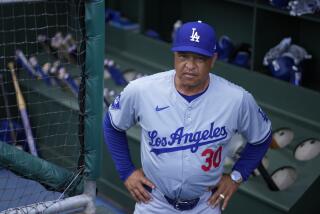MLB needs a better way to show off its next generation of stars
- Share via
Did you see Bryce Harper?
Probably not, and therein lies the biggest problem with the All-Star game festivities.
The biggest problem was not that Derek Jeter did not show up, or that Justin Verlander could not pitch, or that the ratings sunk to a record low.
No, the most significant wound is the self-inflicted one. Baseball sets up a brilliant event to showcase its up-and-coming stars, then virtually ensures fans will not see it.
We’re talking about the Futures game, the coming-out party for baseball’s very finest prospects. In this age of information overload, where even casual fans have heard of Harper or Mike Trout long before either one makes his major league debut, the Futures game offers fans across America a first look at the phenoms of the year.
You have to look hard to find it, though, and you have to look away from a full slate of major league games.
When former Angels prospect Tyler Skaggs — the key to last year’s Dan Haren trade with the Arizona Diamondbacks — threw the first pitch in this year’s Futures game July 10, the Angels and Dodgers were playing. As the Futures game entered the late innings, ESPN was showing the World Series champion San Francisco Giants.
Thanks to college football and college basketball, the top NFL and NBA rookies arrive with name recognition and national exposure. So hats off to baseball’s creative if modest answer — a minor league All-Star game two days before the real All-Star game.
Yet, baseball buries what should be a special event beneath an avalanche of regular-season games. The lords of the sport ought to move the Futures game from the Sunday preceding the All-Star game to the Monday preceding the All-Star game.
The home run derby would then move to Tuesday, with the All-Star game pushed to Wednesday. Every team would resume the schedule Friday.
No more worries about Verlander and other pitchers starting Sunday and unavailable for an inning two days later. No more issues with players ducking the All-Star game rather than scrambling for cross-country flights Sunday night to show up for All-Star festivities Monday morning. No more concerns about the inequity in some teams getting a three-day All-Star vacation and others a four-day break.
We’re told that Fox has discussed the possibility of moving the All-Star game to Wednesday, since more stars on the field can only help the ratings. Commissioner Bud Selig says he would consider the change.
If and when baseball makes the change — and, really, there is no good reason not to — you’ll hear all about how much better the All-Star game should be. No doubt, what with a better chance to get the very best players into the game.
We’d prefer to look at it this way: Why hide the next generation of stars from your fans Sunday, when you can put them on display Monday? Basketball and hockey are done, football has not started and the national sports spotlight could shine on the Futures game.
This is not to say every fan would watch, or even a majority of fans. But there are few better ways for baseball to invest in its future than to let ESPN hype a prospect showcase on a night without any other major sporting event to watch. We might even say this about the Futures game: This time it counts.
Rare sighting
The Angels and Oakland Athletics played a doubleheader Saturday, the old-fashioned way — one game right after the other, and not involving a makeup game. Two games, one day, one price.
As a 76-year-old avowed traditionalist, Selig should love that. As commissioner, Selig had a one-word answer to the question of whether we might see the revival of old-fashioned doubleheaders.
“No,” he said.
For the A’s and Angels, the doubleheader enabled the players to extend the All-Star break by one day. However, a traditional doubleheader had not been scheduled in the major leagues in eight years. The Angels have not played one at home since 1978.
Selig works for the owners, and he was refreshingly blunt about the primary reason owners disdain doubleheaders: Why play two games before one crowd when you can play two games before two crowds?
“Clubs do what they have to do because revenue is so important,” Selig said.
However, Selig said, fans are not clamoring for doubleheaders, and a glance at the box scores shows why. On Aug. 5, 1978 — so long ago that Brian Downing caught for the Angels and Rod Carew played for the Minnesota Twins — the Angels and Twins played two in Anaheim.
The two games, combined, took 4 hours 56 minutes to play. Seems like the Boston Red Sox and New York Yankees take that long to play every one of their games these days.
twitter.com/BillShaikin
More to Read
Go beyond the scoreboard
Get the latest on L.A.'s teams in the daily Sports Report newsletter.
You may occasionally receive promotional content from the Los Angeles Times.











